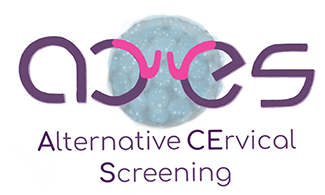We know that cervical screening saves lives by preventing cervical cancer. Cervical screening, also known as the smear test, involves testing cervical cells for human papillomavirus (HPV).
Currently, only 7 in 10 people in the UK attend cervical screening. This may be due to embarrassment, fear, discomfort or lack of time.
A urine test could help solve these issues. The Alternative Cervical Screening (ACES) in Primary Care study is finding out whether a urine test could offer an accurate alternative to routine cervical screening.
We want to see:
- How well a urine HPV test performs in comparison to routine cervical screening;
- How people feel about cervical screening and their preferences for future tests.
The project is run by The University of Manchester and takes place across selected GP practices and NHS clinics in Greater Manchester. The study is funded by the National Institute for Health Research.
On this page:

What the study involves
You can take part in our study on the same day that you attend your routine cervical screening test at your GP practice or NHS clinic. Taking part is entirely voluntary.
Taking part in the study involves two steps:
1. Providing a urine sample
You can collect your urine in the privacy of the NHS clinic bathroom just before you have your cervical screening test.
We will give you a special urine collection device called a Colli-Pee at your appointment. Please only collect your urine using the Colli-Pee.
You should wait at least 1 hour after you last went to the toilet before you collect your urine sample.
To see how the Colli-Pee works, you can watch our video:
2. Answering some questions
We will ask you about your medical history and your thoughts about the urine and cervical tests. This is optional.
Your routine cervical screening appointment will go ahead as normal. Your appointment may take 10-15 minutes longer so that you can collect your urine and answer the study questions.
More information can be found in the ACES study patient information sheet (PDF, 559KB).
Download the patient information sheet in other languages:
- عربي (Arabic) (PDF, 1.2 MB)
- বাংলা (Bengali) (PDF, 1.2 MB)
- Polski (Polish) (PDF, 599KB)
- اردو (Urdu) (PDF, 1.1 MB)
You can also contact us if you have any questions.

How to take part
If you are a patient at the one of the following GP practices or NHS Trust, you can inform the practice that you would like to take part prior to your cervical screening appointment.
They will book extra time for your visit. Please give as much notice as you can.
Bowland Medical Practice
M23 1JX
Tel: 0161 998 2014
Visit website
Didsbury Medical Centre
M20 6BA
Tel: 0161 445 1957
Visit website
Surrey Lodge Practice
M14 5BY
Tel: 0161 224 2471
Visit website
The Maples Medical Centre
M23 2SY
Tel: 0161 498 8484
Visit website
Urban Village Medical Practice
M4 6EE
Tel: 0161 272 5656
Visit website
Hawthorn Medical Centre
M14 6FS
Tel: 0161 220 6080
Visit website
Manchester University NHS Foundation Trust
The Hathersage Centre
280 Upper Brook St
Manchester
M13 0FH
Tel (Nurses Office): 0161 276 5221
New Islington Medical Practice
M4 6EE
Tel: 0161 272 5660
Visit website
Queen Square Medical Practice
2 Queen Square
Lancaster
LA1 1RP
Tel: 01524 843333
Visit website
If your GP practice or NHS Trust isn’t listed above, you cannot take part in the ACES study.
If you are a member of GP staff and wish to know more about how your GP practice can participate in this study, please contact us.

Who we are
The ACES study team is based at The University of Manchester and Manchester University NHS Foundation Trust.
- Professor Emma Crosbie (Chief Investigator)
- Dr Alex Sargent (Co-Investigator)
- Dr Jen Davies-Oliveira (Clinical Research Fellow)
- Suzanne Carter (Project Manager)
Contact us
If you would like further information about our study, please get in touch.
Email: ACES@manchester.ac.uk
Telephone: 0161 701 6941

